- Home
- Emile Gaboriau
Caught in the Net Page 6
Caught in the Net Read online
Page 6
CHAPTER VI.
A MEDICAL ADVISER.
Doctor Hortebise did not find it necessary to resort to any of thoseexpedients which Mascarin had found it advisable to use in order toreach Madame de Mussidan. As soon as he presented himself--that is,after a brief interval of five minutes--he was introduced into thepresence of the Countess. He rather wondered at this, for Madame deMussidan was one of those restless spirits that are seldom found athome, but are to be met with at exhibitions, on race-courses, at the_salons_, restaurants, shops, or theatres; or at the studio of somefamous artist; or at the rooms of some musical professor who haddiscovered a new tenor; anywhere and everywhere, in fact, except athome. Hers was one of those restless natures constantly craving forexcitement; and husband, home, and child were mere secondary objects inher eyes. She had many avocations; she was a patroness of half a dozencharitable institutions, but the chief thing that she did was to spendmoney. Gold seemed to melt in her grasp like so much snow, and she neverknew what became of the sums she lavished so profusely. Husband andwife had long been almost totally estranged, and led almost separateexistences. Dr. Hortebise was well aware of this, in common with otherswho moved in society. Upon the appearance of the doctor, the Countessdropped the book she had been perusing, and gave vent to an exclamationof delight. "Ah, doctor, this is really very kind of you;" and at thesame time signed to the servant to place a chair for the visitor.
The Countess was tall and slender, and at forty-five had the figure ofa girl. She had an abundance of fair hair, the color of which concealedthe silver threads which plentifully interspersed it. A subtle perfumehung about her, and her pale blue eyes were full of pride and colddisdain.
"You know how to time your visits so well, doctor!" said she. "I amthoroughly bored, and am utterly weary of books, for it always seems tome, when I read, that I had perused the same thing before somewhere orother. You have arrived at so opportune a moment, that you appear to bea favorite of timely chance."
The doctor was indeed a favorite of chance; but the name of the chancewas Baptiste Mascarin.
"I see so few visitors," continued Madame de Mussidan, "that hardly anyone comes to see me. I must really set aside one day in the week for myat home; for when I do happen to stay at home, I feel fearfully dulland lonely. For two mortal hours I have been in this room. I have beennursing the Count."
The doctor knew better than this; but he smiled pleasantly, and said,"Perfectly so," exactly at the right moment.
"Yes," continued the Countess, "my husband slipped on the stairs, andhurt himself very much. Our doctor says it is nothing; but then I putlittle faith in what doctors say."
"I know that by experience, madame," replied Hortebise.
"Present company of course always excepted; but, do you know, I oncereally believed in you; but your sudden conversion to homeopathy quitefrightened me."
The doctor smiled. "It is as safe a mode of practice as any other."
"Do you really think so?"
"I am perfectly sure of it."
"Well, now that you _are_ here, I am half inclined to ask your advice."
"I trust that you are not suffering."
"No, thank heaven; I have never any cause to complain of my health; butI am very anxious about Sabine's state."
Her affection of maternal solicitude was a charming pendant to herdisplay of conjugal affection, and again the doctor's expression ofassent came in in the right place.
"Yes, for a month, doctor, I have hardly seen Sabine, I have been somuch engaged; but yesterday I met her, and was quite shocked at thechange in her appearance."
"Did you ask her what ailed her?"
"Of course, and she said, 'Nothing,' adding that she was perfectlywell."
"Perhaps something had vexed her?"
"She,--why, don't you know that every one likes her, and that she is oneof the happiest girls in Paris; but I want you to see her in spite ofthat." She rang the bell as she spoke, and as soon as the footman madehis appearance, said, "Lubin, ask Mademoiselle to have the goodness tostep downstairs."
"Mademoiselle has gone out, madame."
"Indeed! how long ago?"
"About three o'clock, madame."
"Who went with her?"
"Her maid, Modeste."
"Did Mademoiselle say where she was going to?"
"No, madame."
"Very well, you can go."
Even the imperturbable doctor was rather surprised at a girl of eighteenbeing permitted so much freedom.
"It is most annoying," said the Countess. "However, let us hope that thetrifling indisposition, regarding which I wished to consult you, willnot prevent her marriage."
Here was the opening that Hortebise desired.
"Is Mademoiselle going to be married?" asked he with an air ofrespectful curiosity.
"Hush!" replied Madame de Mussidan, placing her finger on her lips;"this is a profound secret, and there is nothing definitely arranged;but you, as a doctor, are a perfect father confessor, and I feel thatI can trust you. Let me whisper to you that it is quite possible thatSabine will be Madame de Breulh-Faverlay before the close of the year."
Hortebise had not Mascarin's courage; indeed, he was frequentlyterrified at his confederate's projects; but having once given in hisadherence, he was to be relied on, and did not hesitate for a moment."I confess, madame, that I heard that mentioned before;" returned hecautiously.
"And, pray, who was your informant?"
"Oh, I have had it from many sources; and let me say at once that it wasthis marriage, and no mere chance, that brought me here to-day."
Madame de Mussidan liked the doctor and his pleasant and wittyconversation very much, and was always charmed to see him; but itwas intolerable that he should venture to interfere in her daughter'smarriage. "Really, sir, you confer a great honor upon the Count andmyself," answered she haughtily.
Her severe manner, however, did not cause the doctor to lose his temper.He had come to say certain things in a certain manner. He had learnedhis part, and nothing that the Countess could say would prevent hisplaying it.
"I assure you, madame," returned he, "that when I accepted the missionwith which I am charged, I only did so from my feelings of respect toyou and yours."
"You are really very kind," answered the Countess superciliously.
"And I am sure, madame, that after you have heard what I have to say,you will have even more reason to agree with me." His manner as hesaid this was so peculiar, that the Countess started as though she hadreceived a galvanic shock. "For more than twenty-five years," pursuedthe doctor, "I have been the constant depository of strange familysecrets, and some of them have been very terrible ones. I haveoften found myself in a very delicate position, but never in such anembarrassing one as I am now."
"You alarm me," said the Countess, dropping her impatient manner.
"If, madame, what I have come to relate to you are the mere ravings ofa lunatic, I will offer my most sincere apologies; but if, on thecontrary, his statements are true--and he has irrefragable proofs in hispossession,--then, madame----"
"What then, doctor?"
"Then, madame, I can only say, make every use of me, for I willwillingly place my life at your disposal."
The Countess uttered a laugh as artificial as the tears oflong-expectant heirs. "Really," said she, "your solemn air and tonesalmost kill me with laughter."
"She laughs too heartily, and at the wrong time. Mascarin is right,"thought the doctor. "I trust, madame," continued he, "that I too maylaugh at my own imaginary fears; but whatever may be the result, permitme to remind you that a little time back you said that a doctor was afather confessor; for, like a priest, the physician only hears secretsin order to forget them. He is also more fitted to console and advise,for, as his profession brings him into contact with the frailties andpassions of the world, he can comprehend and excuse."
"And you must not forget, doctor, that like the priest also, he preachesvery long sermons."
As she uttered this sarcasm, there was a jesting look upon her features,but it elicited no smile from Hortebise, who, as he proceeded, grew moregrave.
"I may be foolish," he said; "but I had better be that than reopen someold wound."
"Do not be afraid, doctor; speak out."
"Then, I will begin by asking if you have any remembrance of a young manin your own sphere of society, who, at the time of your marriage,was well known in every Parisian _salon_. I speak of the Marquis deCroisenois."
The Countess leaned back in her chair, and contracted her brow, andpursed up her lips, as though vainly endeavoring to remember the name.
"The Marquis de Croisenois?" repeated she. "It seems as if----no--wait amoment. No; I cannot say that I can call any such person to mind."
The doctor felt that he must give the spur to this rebellious memory.
"Yes, Croisenois," he repeated. "His Christian name was George, and hehad a brother Henry, whom you certainly must know, for this winter I sawhim at the Duchess de Laumeuse's, dancing with your daughter."
"You are right; I remember the name now."
Her manner was indifferent and careless as she said this.
"Then perhaps you also recollect that some twenty-three years ago,George de Croisenois vanished suddenly. This disappearance caused aterrible commotion at the time, and was one of the chief topics ofsociety."
"Ah! indeed?" mused the Countess.
"He was last seen at the Cafe de Paris, where he dined with somefriends. About nine he got up to leave. One of his friends proposed togo with him, but he begged him not to do so, saying, 'Perhaps I shallsee you later on at the opera, but do not count on me.' The generalimpression was that he was going to some love tryst."
"His friends thought that, I suppose."
"Yes, for he was attired with more care than usual, though he was alwaysone of the best dressed men in Paris. He went out alone, and was neverseen again."
"Never again," repeated the Countess, a slight shade passing across herbrow.
"Never again," echoed the unmoved doctor. "At first his friendsmerely thought his absence strange; but at the end of a week they grewanxious."
"You go very much into details."
"I heard them all at the time, madame, and they were only brought backto my memory this morning. All are to be found in the records of aminute search that the authorities caused to be made into the affair.The friends of De Croisenois had commenced the search; but when theyfound their efforts useless, they called in the aid of the police. Thefirst idea was suicide: George might have gone into some lonely spot andblown out his brains. There was no reason for this; he had ample means,and always appeared contented and happy. Then it was believed that amurder had been committed, and fresh inquiries were instituted, butnothing could be discovered--nothing."
The Countess affected to stifle a yawn, and repeated like an echo,"Nothing."
"Three months later, when the police had given up the matter in despair,one of George de Croisenois' friends received a letter from him."
"He was not dead then, after all?"
Dr. Hortebise made a mental note of the tone and manner of the Countess,to consider over at his leisure.
"Who can say?" returned he. "The envelope bore the Cairo post-mark. Init George declared that, bored with Parisian life, he was going to starton an exploring expedition to Central Africa, and that no one need beanxious about him. People thought this letter highly suspicious. A mandoes not start upon such an expedition as this without money; and it wasconclusively proved that on the day of De Croisenois' disappearancehe had not more than a thousand francs about him, half of which was inSpanish doubloons, won at whist before dinner. The letter was thereforeregarded as a trick to turn the police off the scent; but the bestexperts asserted that the handwriting was George's own. Two detectiveswere at once despatched to Cairo, but neither there nor anywhere on theroad were any traces of the missing man discovered."
As the doctor spoke, he kept his eyes riveted on the Countess, but herface was impassable.
"Is that all?" asked she.
Dr. Hortebise paused a few moments before he replied, and then answeredslowly,--
"A man came to me yesterday, and asserts that you can tell me what hasbecome of George de Croisenois."
A man could not have displayed the nerve evinced by this frail andtender woman, for however callous he may be, some feature will betraythe torture he is enduring; but a woman can often turn a smiling faceupon the person who is racking her very soul. At the mere name ofMontlouis the Count had staggered, as though crushed down by a blow froma sledge hammer; but at this accusation of Hortebise the Countess burstinto a peal of laughter, apparently perfectly frank and natural, whichutterly prevented her from replying.
"My dear doctor," said she at length, as soon as she could manage tospeak, "your tale is highly sensational and amusing, but I really thinkthat you ought to consult a _clairvoyant_, and not a matter-of-factperson like me, about the fate of George de Croisenois."
But the doctor, who was ready with his retort, and, not at alldisconcerted by the cachinations of the Countess, heaved a deep sigh, asthough a great load had been removed from his heart, and, with an air ofextreme delight, exclaimed, "Thank Heaven! then I was deceived."
He uttered these words with an affectation of such sincerity that theCountess fell into the trap.
"Come," said she, with a winning smile, "tell me who it is that says Iknow so much."
"Pooh! pooh!" returned Hortebise. "What good would that do? He has madea fool of me, and caused me to risk losing your good opinion. Is notthat enough? To-morrow, when he comes to my house, my servants willrefuse to admit him; but if I were to do as my inclinations lead me, Ishould hand him over to the police."
"That would never do," returned the Countess, "for that would changea mere nothing into a matter of importance. Tell me the name of yourmysterious informer. Do I know him?"
"It is impossible that you could do so, madame, for he is far below youin the social grade. You would learn nothing from his name. He is a manI once helped, and is called Daddy Tantaine."
"A mere nickname, of course."
"He is miserably poor, a cynic, philosopher, but as sharp as a needle;and this last fact causes me great uneasiness, for at first I thoughtthat he had been sent to me by some one far above him in position,but--"
"But, doctor," interposed the Countess, "you spoke to me of proofs, ofthreats, of certain mysterious persons."
"I simply repeated Daddy Tantaine's words. The old idiot said to me,'Madame de Mussidan knows all about the fate of the Marquis, and thisis clearly proved by letters that she has received from him, as well asfrom the Duke de Champdoce.'"
This time the arrow went home. She grew deadly pale, and started to herfeet with her eyes dilated with horror.
"My letters!" exclaimed she hoarsely.
Hortebise appeared utterly overwhelmed by this display of consternation,of which he was the innocent cause.
"Your letters, madame," replied he with evident hesitation, "thisdouble-dyed scoundrel declares he has in his possession."
With a cry like that of a wounded lioness, the Countess, taking nonotice of the doctor's presence, rushed from the room. Her rapidfootfall could be heard on the stairs, and the rustle of her silkenskirts against the banisters. As soon as he was left alone, the doctorrose from his seat with a cynical smile upon his face.
"You may search," mused he, "but you will find that the birds haveflown." He walked up to one of the windows, and drummed on the glasswith his fingers. "People say," remarked he, "that Mascarin nevermakes a mistake. One cannot help admiring his diabolical sagacity andunfailing logic. From the most trivial event he forges a long chain ofevidence, as the botanist is able, as he picks up a withered leaf, todescribe in detail the tree it came from. A pity, almost, that he didnot turn his talents to some nobler end; but no; he is now upstairsputting the Count on the rack, while I am inflicting tortures on theCountess. What a shameful business we
are carrying on! There are momentswhen I think that I have paid dearly for my life of luxury, for I knowwell," he added, half consciously fingering his locket, "that some daywe shall meet some one stronger than ourselves, and then the inevitablewill ensue."
The reappearance of the Countess broke the chain of his thoughts. Herhair was disturbed, her eyes had a wild look in them, and everythingabout her betrayed the state of agitation she was in.
"Robbed! robbed!" cried she, as she entered the room. Her excitement wasso extreme that she spoke aloud, forgetting that the door was open,and that the lackey in the ante-room could hear all she said. LuckilyHortebise did not lose his presence of mind, and, with the ease of aleading actor repairing the error of a subordinate, he closed the door.
"What have you lost?" asked he.
"My letters; they are all gone."
She staggered on to a couch, and in broken accents went on. "And yetthese letters were in an iron casket closed by a secret spring; thatcasket was in a drawer, the key of which never leaves me."
"Good heavens!" exclaimed Hortebise in affected tones, "then Tantainespoke the truth."
"He did," answered the Countess hoarsely. "Yes," she continued, "I amthe bondslave to people whose names I do not even know, who can controlmy every movement and action."
She hid her face in her hands as though her pride sought to conceal herdespair.
"Are these letters, then, so terribly compromising?" asked the doctor.
"I am utterly lost," cried she. "In my younger days I had no experience;I only thought of vengeance, and lately the weapons I forged myselfhave been turned against me. I dug a pitfall for my adversaries and havefallen into it myself."
Hortebise did not attempt to stay the torrent of her words, for theCountess was in one of those moods of utter despair when the innerfeelings of the soul are made manifest, as during a violent tempest theweeds of ocean are hurled up to the surface of the troubled waters.
"I would sooner be lying in my grave a thousand times," wailed she,"than see these letters in my husband's hands. Poor Octave! have I notcaused him sufficient annoyance already without this crowning sorrow?Well, Dr. Hortebise, I am menaced with the production of these letters,and they will be handed to my husband unless I agree to certain terms.What are they? Of course money is required; tell me to what amount."
The doctor shook his head.
"Not money?" cried the Countess; "what, then, do they require? Speak,and do not torture me more."
Sometimes Hortebise confessed to Mascarin that, putting his interests onone side, he pitied his victims; but he showed no sign of this feeling,and went on,--
"The value of what they require, madame, is best estimated by yourself."
"Tell me what it is; I can bear anything now."
"These compromising letters will be placed in your hands upon the day onwhich your daughter marries Henry de Croisenois, the brother of George."
Madame de Mussidan's astonishment was so great that she stood as thoughpetrified into a statue.
"I am commissioned to inform you, madame, that every delay necessaryfor altering any arrangements that may exist will be accorded you;but, remember, if your daughter marries any one else than Henry deCroisenois, the letters will be at once placed in your husband's hands."
As he spoke the doctor watched her narrowly. The Countess crossed theroom, faint and dizzy, and rested her head on the mantelpiece.
"And that is all?" asked she. "What you ask me to do is utterlyimpossible: and perhaps it is for the best, for I shall have no longagony of suspense to endure. Go, doctor, and tell the villain who holdsmy letters that he can take them to the Count at once."
The Countess spoke in such a decided tone that Hortebise was a littlepuzzled.
"Can it be true," she continued, "that scoundrels exist in our countrywho are viler than the most cowardly murderers,--men who trade in theshameful secrets that they have learned, and batten upon the moneythey earn by their odious trade? I heard of such creatures before, butdeclined to believe it; for I said to myself that such an idea onlyexisted in the unhealthy imaginations of novel writers. It seems,however that I was in error; but do not let these villains rejoice toosoon; they will reap but a scanty harvest. There is one asylum left forme where they cannot molest me."
"Ah, madame!" exclaimed the doctor in imploring accents; but she paid noattention to his remonstrances, and went on with increasing violence,--
"Do the miserable wretches think that I fear death? For years Ihave prayed for it as a final mercy from the heaven I have so deeplyoffended. I long for the quiet of the sepulchre. You are surprised athearing one like me speak in this way,--one who has all her life beenadmired and flattered,--I, Diana de Laurebourg, Countess de Mussidan.Even in the hours of my greatest triumphs my soul shuddered at thethought of the grim spectre hidden away in the past; and I wished thatdeath would come and relieve my sufferings. My eccentricities have oftensurprised my friends, who asked if sometimes I were not a little mad.Mad? Yes, I am mad! They do not know that I seek oblivion in excitement,and that I dare not be alone. But I have learned by this time that Imust stifle the voice of conscience."
She spoke like a woman utterly bereft of hope, who had resolved on thefinal sacrifice. Her clear voice rang through the room, and Hortebiseturned pale as he heard the footsteps of the servants pacing to and frooutside the door, as they made preparations for dinner.
"All my life has been one continual struggle," resumed she,--"a strugglewhich has cost me sore; but now all is over, and to-night, for the firsttime for many years, Diana de Mussidan will sleep a calm and untroubledsleep."
The excitement of the Countess had risen to so high a pitch that thedoctor asked himself how he could allay a tempest which he had notforeseen; for her loud tones would certainly alarm the servants, whowould hasten to acquaint the Count, who was himself stretched upon therack; then the entire plot would be laid bare, and all would be lost.
Madame de Mussidan was about to rush from the room, when the doctor,perceiving that he must act decisively, seized her by both wrists, and,almost by force, caused her to resume her seat.
"In Heaven's name, madame," he whispered, "for your daughter's sake,listen to me. Do not throw up all; am not I here ready to do yourbidding, whatever it may be? Rely upon me,--rely upon the knowledge of aman of the world, and of one who still possesses some portion of what iscalled a heart. Cannot we form an alliance to ward off this attack?"
The doctor continued in this strain, endeavoring to reassure theCountess as much as he had previously endeavored to terrify her, andsoon had the satisfaction of seeing his efforts crowned with success;for Madame de Mussidan listened to his flow of language, hardlycomprehending its import, but feeling calmer as he went on; and in aquarter of an hour he had persuaded her to look the situation boldlyin the face. Then Hortebise breathed more freely, and, wiping theperspiration from his brow, felt that he had gained the victory.
"It is a nefarious plot," said the Countess.
"So it is, madame; but the facts remain. Only tell me one thing, haveyou any special objection to M. de Croisenois paying his addresses toyour daughter?"
"Certainly not."
"He comes from a good family, is well educated, handsome, popular, andonly thirty-four. If you remember, George was his senior by fifteenyears. Why, then, is not the marriage a suitable one? Certainly, he hasled rather a fast life; but what young man is immaculate? They saythat he is deeply in debt; but then your daughter has enough for both.Besides, his brother left him a considerable fortune, not far short oftwo millions, I believe; and to this, of course Henry will eventuallysucceed."
Madame de Mussidan was too overwhelmed by what she had already gonethrough to offer any further exposition of her feelings on the subject.
"All this is very well," answered she; "but the Count has decided thatSabine is to become the wife of M. de Breulh-Faverlay, and I have novoice in the matter."
"But if you exert your influence?"
The Countes
s shook her head. "Once on a time," said she sadly, "Ireigned supreme over Octave's heart; I was the leading spirit of hisexistence. Then he loved me; but I was insensible to the depths of hisaffection, and wore out a love that would have lasted as long as lifeitself. Yes, in my folly I slew it, and now----" She paused for a momentas if to collect her ideas, and then added more slowly: "and now ourlives are separate ones. I do not complain; it is all my own fault; heis just and generous."
"But surely you can make the effort?"
"But suppose Sabine loves M. de Breulh-Faverlay?"
"But, madame, a mother can always influence her daughter."
The Countess seized the doctor's hand, and grasped it so tightly that hecould hardly bear the pain.
"I must," said she in a hoarse whisper, "divulge to you the whole extentof my unhappiness. I am estranged from my husband, and my daughterdislikes and despises me. Some people think that life can be dividedinto two portions, one consecrated to pleasure and excitement, and theother to domestic peace and happiness; but the idea is a false one. Asyouth has been, so will be age, either a reward or an expiation."
Dr. Hortebise did not care to follow this train of argument--for theCount might enter at any moment, or a servant might come in to announcedinner--and only sought to soothe the excited feelings of Madame deMussidan, and to prove to her that she was frightened by shadows, andthat in reality she was not estranged from her husband, nor did herdaughter dislike her; and finally a ray of hope illuminated the saddenedheart of the unfortunate lady.
"Ah, doctor!" said she, "it is only misfortune that teaches us to knowour true friends."
The Countess, like her husband, had now laid down her arms; she had madea longer fight of it, but in both cases the result had been the same.She promised that she would commence operations the next day, and do herutmost to break off the present engagement.
Hortebise then took his leave, quite worn out with the severe conflicthe had waged during his two hours' interview with the Countess. In spiteof the extreme cold, the air outside seemed to refresh him considerably,and he inhaled it with the happy feeling that he had performed his dutyin a manner worthy of all praise. He walked up the Rue de Faubourg SaintHonore, and again entered the _cafe_ where he and his worthy confederatehad agreed to meet. Mascarin was there, an untasted cutlet before him,and his face hidden by a newspaper which his anxiety would not permithim to peruse. His suspense was terrible. Had Hortebise failed? had heencountered one of those unforeseen obstacles which, like a minute grainof sand, utterly hinders the working of a piece of delicate machinery?
"Well, what news?" said he eagerly, as soon as he caught sight of thedoctor.
"Success, perfect success!" said Hortebise gayly. "But," added he, as hesank exhausted upon a seat, "the battle has been a hard one."

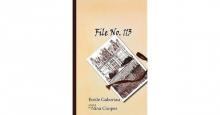 Le dossier no. 113. English
Le dossier no. 113. English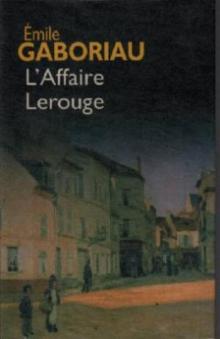 L'affaire Lerouge. English
L'affaire Lerouge. English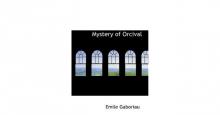 Le crime d'Orcival. English
Le crime d'Orcival. English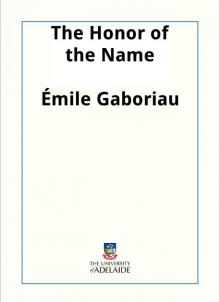 The Honor of the Name
The Honor of the Name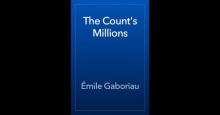 The Count's Millions
The Count's Millions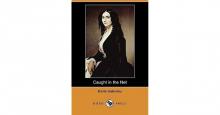 Caught in the Net
Caught in the Net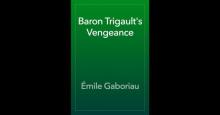 Baron Trigault's Vengeance
Baron Trigault's Vengeance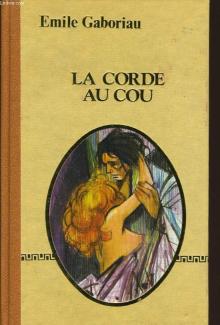 La clique dorée. English
La clique dorée. English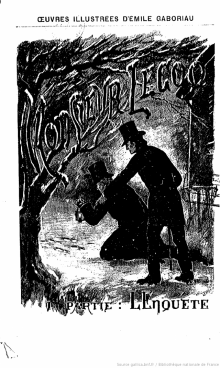 Monsieur Lecoq, v. 1
Monsieur Lecoq, v. 1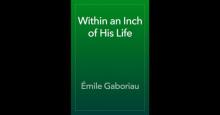 Within an Inch of His Life
Within an Inch of His Life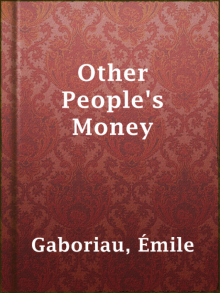 Other People's Money
Other People's Money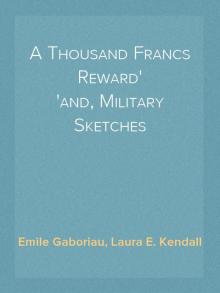 A Thousand Francs Reward; and, Military Sketches
A Thousand Francs Reward; and, Military Sketches